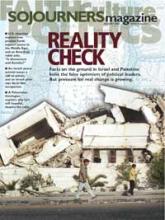This past May I spent two weeks in Vietnam. Each year I lead a group of university students on a trip to monitor the effects of globalization. Last year our destination was India, the year prior to that Peru.
My aim is to see firsthand if expanding global markets are creating increased opportunities for the worlds poor. My students and I study how economic markets are structured in a given country, and whether mechanisms in place will lead to economic growth for the many or affluence for the few.
We also focus on how political systems respond to changes in capital investment and new production. Finally, we take a close look at cultural and religious values and whether they are stable or lose their hold on individuals and families in a fast-changing society.
In that frame, Vietnam is the perfect laboratory. The country is one of the worlds few remaining communist political systems. For the past 30 years, both North and South have been united under one government. About five years ago, the Vietnamese government made a public commitment to capital free markets. Once disdained, foreign investment suddenly became a welcome friend; that is, as long as the investment was made in venture with a Vietnamese-based company.
Read the Full Article
